Senior Health and Fitness Tips
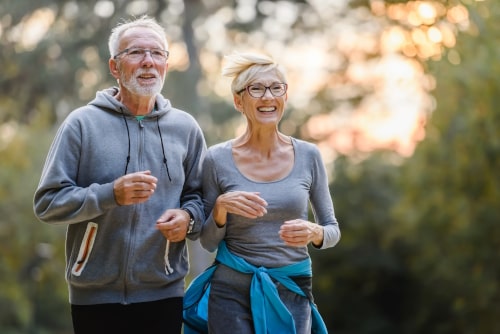

Age beautifully with these senior health and fitness tips. It's never too late for anyone, at any age, to start making lifestyle changes that keep them fit and healthy.
Fitness for seniors is not a modified exercise program nor is it a special diet. It's a lifestyle that will help promote health and minimize medical issues.
As we age there are more hurdles for us to jump over in order to get fit. Our bones are getting weaker, our joints ache more and our metabolism has slowed way down.
Don't let these hurdles get in your way. Now is the time to change your lifestyle and approach foods and activities in a new and healthy way.
Know Your Limits
Before starting your new senior health and fitness plan, be sure you know your limits. Don't dive right into any senior exercise routine, change your eating habits or make changes in your daily routines until you know if you have limitations.
If you have health risks, these may limit your choices for your workouts and/or your food selections. Seeing your doctor before starting any exercise is always sound advice but is not necessary.
If you have a medical condition, any unexplained symptoms or you haven't had a physical in a long time, then please check with your doctor first. Experts also suggest you talk to your doctor before starting a senior health and fitness routine if any of the following apply;


- You have had a heart attack.
- You have heart, liver, kidney or lung disease.
- You have asthma, arthritis, osteoporosis or diabetes.
- You have pain in your chest, joints or muscles during physical activity.
- You have had joint replacement surgery, have an untreated joint or muscle injury or persistent symptoms after a joint or muscle injury.
- You have had a loss of balance, dizziness or loss of consciousness.
- You are currently taking medication for a chronic condition.
- You are pregnant.
Additionally, if you are just unsure of your health status, consult with your doctor. In addition to the above, the American College of Sports Medicine also recommend you see or talk to your doctor if two or more of the following apply;
- You're a man older than age 45 or a woman older than age 55.
- You have a family history of heart disease before age 55.
- You have high blood pressure or high cholesterol.
- You smoke or you quit smoking in the past six months.
- You're overweight or obese.
If you don't need to see your doctor first, just start slowly and don't over do it.
Removing Obstacles
There are many myths about senior health and fitness that might be preventing you from starting your exercises. You might be thinking that you are too old or that you will hurt yourself.
No matter what your age is or even if you have some physical limitations, it's never too late to start your fitness plan and improve how you age.
You just need to remove the obstacles in your way of thinking in order to get moving. One way to remove the obstacles is to remove the myths.
Myth 1 - I'm too old to start exercising
When it comes to exercising for seniors, it really is never too late to start. Even simple, low impact activities can help improve your health. Being more active will help improve your mood, minimize risk of injury or falls, improve muscle and bone strength and can ward off certain diseases. Check out all these exercise benefits.
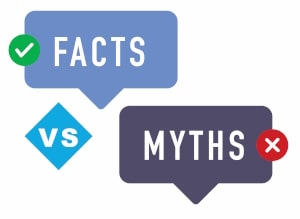

Myth 2 - I have too many aches and pains
Having aches and pains from arthritis might seem like a good reason to stay inactive.
The truth is, exercise can help alleviate some of these aches and pains. Studies show that exercise helps with joint pain.
One study of people over 60 years of age with knee arthritis found that those who exercised reported less pain and showed better joint function.
Myth 3 - I might have a heart attack
You may have heard of a story or two of someone who had a heart attack while exercising. This does happen, however, the small risk is outweighed by the many benefits of being active. In fact, sitting idle and not moving is more dangerous for your health and can lead to heart disease and other conditions.
Myth 4 - I've never exercised before so it's too late to make a difference now
Research has shown that even if you wait until late in life to start, exercising can still cut the risk of health problems like diabetes. Studies have shown that even people in their 90's showed improved muscle strength through exercise. So even if you have never exercised before, you can still reap the benefits of getting active today.
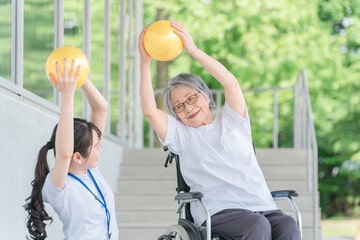

Myth 5 - Exercise isn't safe at an older age.
As seniors, worrying about falling and injuring yourself is a legitimate concern. However, studies have shown that by exercising, you are actually reducing your risks of falls and injuries. Balance exercises are one of the best types of workouts for seniors to help minimize falls. Use the back of the chair for balance as you exercise or simply sit in the chair and do some stretches or strengthening workouts.
Myth 6 - Exercise isn't possible because of a disability.
Perhaps you are in a wheelchair or need assistance walking due to age or even an injury or permanent disability. If that's the case, then try being active within your movement ability. If you can only use your upper body, then do some strength training exercises in your chair. Check out these chair exercises to help you get active.
If you are bed ridden, try lifting your arms, legs or even lifting yourself up slightly off the pillow just to have some form of movement.
Understanding these myths versus the facts will help you remove the obstacles in your mind about starting your senior health and fitness routine.
Exercises for Senior Health and Fitness
Now that you have removed the obstacles, you are ready to get fit and healthy. Being active is one of the best ways to becoming more fit and healthy. There are many ways to get moving and being more active. You want to ensure your activities are within your limitations and are diverse. Doing both aerobic movements and strength training is what you want to aim for. You can also add some balance exercises as well as stretches to keep you healthy.
Start Slow
Remember it took you 40 plus years to get where you are today so don’t expect to get fit overnight. If you have led a sedentary life for many years, then it will take some time to get used to being more active.Buy a good pair of walking shoes and start taking leisurely walks as a start. You can simply walk around the house or walk just a short distance in your neighborhood. Just start off slow but steady.
Once you have broken in your new shoes and feel that you are ready, step it up to a brisk walk. Ask a friend to join and enjoy the weather outside. Be sure you are walking correctly in order to minimize shin splints and joint soreness. Check out this article on Walking for Exercise
If the weather is too cold and sidewalks are too icy, try staying inside and simply march in place. Just go at an easy pace until you are ready to do a bit more.
You can always add something new and fun. Try something you enjoy like gardening, golfing or even bowling to add more activity in your daily routines.
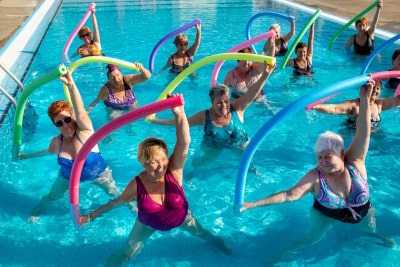

Endurance Exercises(Aerobics)
Aerobics are often thought of as 3 mile long runs, sweating at the gym or pounding away on a treadmill. Your senior exercises don't have to be fast nor do you have to sweat to get a good workout. Aerobics, also known as cardiovascular exercises, are those activities that get your heart pumping and the blood circulating.
So your endurance training can be a brisk walk, swimming, or even gardening and playing golf. Pick activities that you enjoy and will stick with.
Start out slow especially if you have been relatively inactive for awhile. Try doing an activity that keeps your heart rate slightly elevated for a duration of 5 minutes.
As you get comfortable with this, increase your time. Your workouts should be at a level where you can still talk. You don't want to be out of breath as this can cause dizziness. If you experience dizziness, chest pains or difficulty talking while working out then you are working at too high of a level. Slow it down.
If you are still experiencing these symptoms, consult with your doctor. Make sure you drink plenty of water before, during and after your workout. Don't forget to stretch your muscles before and after your workouts and always warm up before and after your exercises as well.
A great aerobic workout that is easy on the joints and helps tone muscles is water aerobics.
Strength Training for Seniors
Getting up and active is the first step to your senior health and fitness lifestyle. However, don’t just limit your activity to aerobic exercises. Add some strength training to your weekly workouts.
Strength training is not just for body builders. More and more seniors are picking up the weights, grabbing the resistance band and getting fit with strength training.
Building lean muscle not only helps you get fit but has many health benefits for seniors as well.
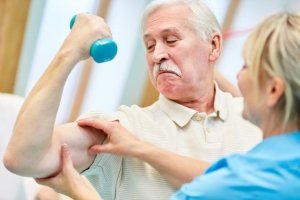
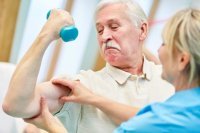
- Helps lower the “bad cholesterol” and raise the good.
- Reduces risk of diabetes, heart disease and osteoporosis.
- Lowers blood pressure
- Increases the immune system, reducing your chances of getting a cold or other illnesses.
- Strengthens your bones
- Improves posture
Other benefits of strength training for seniors includes;
- Increased Bone Mineral Density
As we get older we begin to lose bone mass. This is because your bones are breaking down faster than new bone can be rebuilt. With strength training and getting enough calcium you can minimize the amount of bone loss. - Increased Strength
With increased strength and balance seniors are less likely to injure themselves due to a fall. You want to keep strong legs and body to be able to perform everyday tasks without the worry or risk of injury. - Improves Sleep
Exercise helps improve your ability to get a good nights sleep. With proper sleep you are more alert, you will have better cognitive functions and improved state of mind.
Before you begin any strength training routine make sure you know your limitations. Check with your doctor if you are unsure.
Make sure you breathe during your strengthening exercises to ensure you are getting the proper oxygen to your muscles. Avoid jerky moves and instead use smooth, steady movements. Avoid locking your elbows, knees and other joints to minimize strain on these joints.
Don't worry if you feel some muscle soreness and slight fatigue as this is normal. However, if it lasts more than a few days check with your doctor. Aches in your joints, painful muscle pulls or exhaustion are not normal so if you experience these symptoms, check with your doctor.
Here are several senior strength training exercises with instructions and an exercise video to ensure you are doing them correctly. If you want to do your strength training in the safety of a chair, then check out the list of chair exercises on this site.
Eating Right for Senior Health and Fitness


Being active is just one ingredient to your fitness program. You also want to eat right for healthy aging. As we age, the risks of getting certain diseases can increase.
These include heart disease, diabetes and high blood pressure. Choosing the right foods can minimize the risk and improve symtoms if you already have these medical concerns.
Here are just a few ways to alter your food selections to help you with your senior health and fitness program.
- Lower Sodium
Choose low sodium options when you can and limit the use of salt in your recipes. Season foods with herbs and citrus such as lemon juice instead of salt. - Reduce Sugars
Look for foods that have no added sugars. This can help control your blood sugar levels. Try foods that are naturally sweetened like fruits. - Watch Saturated Fats
Foods high in saturated fats can lead to high cholesterol which can lead to other health issues. Select foods that are lower (or zero) in saturated fats. - Get Your Protein
Make sure you are getting your protein in with each meal. Protein helps to maintain your muscle mass. - Drink Water
Stay well hydrated during the day. Water is great for your kidneys and digestive system. It also helps regulate body temperature and helps curb your appetite for those trying to lose weight.
As we age, our metabolism slows down. This means you can no longer eat the way you ate just 5 or 10 years ago. If you have started to put on some extra weight, now is the time to start tracking those calories.
Additional Articles
Weight Gain After Menopause
Gaining weight during and after menopause is not that uncommon. Find out why this happens and how you can avoid packing on the extra pounds.
Weight Loss over 40
Don't let your age keep you from reaching your goals. Read this article for tips on losing weight even after the age of 40.
Lower Body Stretches
Keep those muscles healthy with these stretching exercises.
